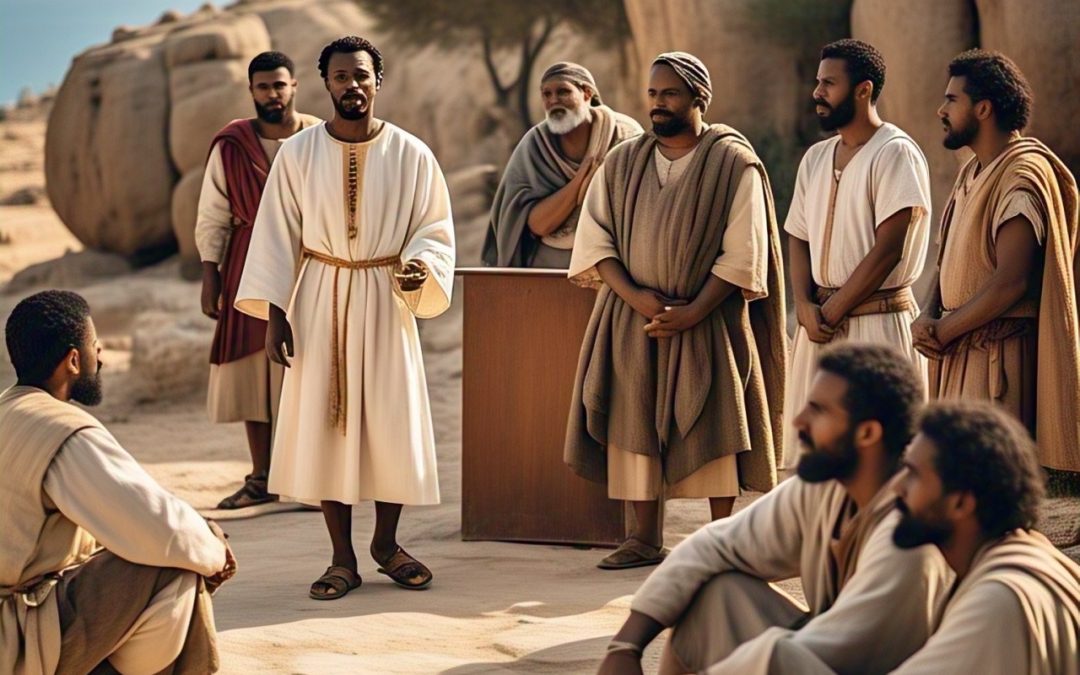
by Eron Henry | Mar 7, 2025 | Lent 2025
Someone once said that by faith we live in the past, by hope we live in the future, but by love we live in the present.
Faith connects us to the past, reminding us of God’s faithfulness throughout history, particularly in the life, death, and resurrection of Jesus Christ. This faith is not merely intellectual assent but a deep trust in God’s promises and actions in the past, giving us a foundation for the present. Faith allows us to learn from those who came before us and to imitate their perseverance. Remembering that we have been ransomed from a meaningless existence by Christ’s blood should inspire us to live in reverence. We have a “great cloud of witnesses” and can see how those who have gone before us have demonstrated their love for God.
Hope directs us toward the future, motivating us to persevere amidst present challenges. The hope of the Christian is centered on the return of Christ and the promise of eternal life, which purifies and transforms our current lives. This hope is not wishful thinking but a confident expectation based on God’s faithfulness, and it compels us to live righteously, in anticipation of the grace that will be brought to us when Jesus Christ is revealed. Hope also inspires us to seek the things above, to set our minds on heavenly matters, and to put to death the earthly desires within us.
Love, however, is the virtue that grounds us in the present moment, as love is the fulfillment of the law. It calls us to engage with the world and with others, reflecting God’s love in our actions. Love is not simply a feeling but a commitment to serve others and to meet their needs. Loving others as Christ loves us is a new commandment and a mark of being a disciple of Jesus. This love requires us to be compassionate, forgiving, and generous. This love should be without complaining, fervent, and covering a multitude of sins. Love is the driving motivation behind all actions, and it is the most important virtue.
This Lenten season is a time to examine the balance of faith, hope, and love in our lives.
- Are we rooted in the faith that recognizes God’s faithfulness in the past, and are we learning from the examples of those who have gone before us?
- Do we have a genuine hope that motivates us toward the future and informs our present choices?
- Are we actively showing love to those around us, reflecting God’s character and demonstrating our faith?
Prayer
Heavenly Father,
We come before You with hearts full of gratitude for Your faithfulness throughout history. By faith, we remember Your mighty works, especially the life, death, and resurrection of Jesus Christ. Help us to trust deeply in Your promises and to draw strength from the examples of those who have gone before us. May our faith be a firm foundation, guiding us to live reverently and purposefully.
Lord, we look to the future with hope, confident in the return of Christ and the promise of eternal life. Let this hope purify and transform our lives, motivating us to persevere through present challenges. Teach us to set our minds on heavenly matters and to live righteously, anticipating the grace that will be revealed when Jesus comes again.
In the present moment, we seek to embody Your love. Fill our hearts with compassion, forgiveness, and generosity. Help us to serve others selflessly, reflecting Your love in all our actions. May our love be fervent and without complaint, covering a multitude of sins. Let it be the driving force behind everything we do, marking us as true disciples of Jesus.
During this Lenten season, we ask for Your guidance as we examine the balance of faith, hope, and love in our lives. Root us in faith, inspire us with hope, and ground us in love. May we always recognize Your faithfulness, be motivated by the hope of eternal life, and actively show love to those around us.
In Jesus’ name, we pray.
Amen.

by Eron Henry | Mar 6, 2025 | Lent 2025
True life is found in serving God and caring for others. A life devoted to God is expressed through love, service, and a commitment to living righteously, not just through adherence to religious practices. This authentic life stands in stark contrast to a life focused on self-interest and worldly desires.
Serving God involves living in accordance with God’s will and striving for holiness in all aspects of life. This includes resisting temptation and the desires of the flesh, instead choosing a path of righteousness. It also means setting our minds on things above, seeking to live in a way that honors God, and recognizing that we are called to a higher purpose than the pursuit of worldly gain or pleasure. The call to holiness is not a call to legalism but rather to a life of love and service that is pleasing to God.
Caring for others is also an essential aspect of an authentic life. It is clear that love for God is intertwined with love for our neighbor, demonstrating that true faith is expressed through acts of kindness, compassion, and generosity. This care extends to those in need, including the poor, the marginalized, and the suffering. Serving others also includes acts of forgiveness, forbearance, and encouragement. A life lived authentically is a life that puts the needs of others before one’s own and seeks to build up the community of believers.
True joy and fulfillment are found not in self-seeking but in the act of giving and serving. A life dedicated to serving God and caring for others is a life of purpose and meaning. In contrast, a life focused on self is empty and ultimately unsatisfying. Authentic living requires a transformation of the heart and mind, a shift away from self-centeredness towards a focus on God and others.
Are we truly serving God with our whole hearts, or are we simply going through the motions? Are we actively seeking to love and serve others, or are we more concerned with our own comfort and convenience? Are we striving for holiness in all that we do, or are we allowing the desires of the flesh to control us? This is a time to repent of our self-centeredness, to recommit ourselves to serving God, and to embrace a life of love and service toward others. As we move through Lent and look towards Easter, we should seek to live more authentically, reflecting the very nature of Christ, who came not to be served but to serve. By doing so, we will discover the abundant life that God has promised.
Prayer
Heavenly Father,
We come before You with hearts open to Your will, seeking to live lives that are truly devoted to You. Help us to understand that true life is found in serving You and caring for others. May our devotion be expressed through love, service, and a commitment to living righteously, rather than merely adhering to religious practices.
Lord, guide us to live in accordance with Your will, striving for holiness in all aspects of our lives. Give us the strength to resist temptation and the desires of the flesh, choosing instead the path of righteousness. Help us to set our minds on things above, seeking to honor You in all that we do, and recognizing that we are called to a higher purpose than the pursuit of worldly gain or pleasure.
Holy Spirit, inspire us to care for others as an essential aspect of our authentic lives. Let our love for You be intertwined with love for our neighbors, demonstrated through acts of kindness, compassion, and generosity. May we extend our care to those in need, including the poor, the marginalized, and the suffering. Teach us to serve others with acts of forgiveness, forbearance, and encouragement, putting their needs before our own and building up the community of believers.
Lord, we know that true joy and fulfillment are found not in self-seeking but in the act of giving and serving. Help us to embrace a life dedicated to serving You and caring for others, finding purpose and meaning in this calling. Transform our hearts and minds, shifting our focus away from self-centeredness towards a focus on You and others.
As we move through this season of Lent and look towards Easter, may we seek to live more authentically, reflecting the very nature of Christ, who came not to be served but to serve. By doing so, may we discover the abundant life that You have promised.
In Your holy name, we pray.
Amen.

by Eron Henry | Mar 5, 2025 | Lent 2025
Lent is a significant period in the Christian liturgical calendar, observed by many Christian traditions, including Roman Catholics, Anglicans, Lutherans, Methodists, and Baptists. It spans 40 days, beginning on Ash Wednesday and culminating in Holy Week, which leads up to Easter Sunday/Resurrection Sunday. This period is marked by reflection, repentance, and preparation for the celebration of the resurrection of Jesus Christ.
Ash Wednesday, the first day of Lent, derives its name from the practice of placing ashes on the foreheads of the faithful. These ashes, typically made from the burnt palms of the previous year’s Palm Sunday, symbolize mortality and repentance. The ritual phrase “Remember that you are dust, and to dust you shall return” (Genesis 3:19) underscores the transient nature of human life and the need for spiritual renewal.
Lent is rooted in the 40 days Jesus spent fasting in the wilderness, as described in the Gospels of Matthew, Mark, and Luke. During this time, Jesus faced temptation by Satan but emerged spiritually strengthened. Similarly, Christians are called to engage in practices of fasting, prayer, and almsgiving during Lent to deepen their faith and resist spiritual temptations.
Fasting during Lent traditionally involves abstaining from certain foods or meals, reflecting Jesus’ sacrifice and fostering self-discipline. Some persons fast from other practices or habits, such as purchases, entertainment, and in more modern times, social media and other forms of online engagement. Prayer is intensified, with many Christians participating in additional services or devotions. Almsgiving, or acts of charity, is also emphasized, encouraging believers to extend compassion and support to those in need.
Lent serves as a time of spiritual renewal and growth, inviting Christians to examine their lives, seek forgiveness, and commit to living more faithfully. It is a journey of transformation, leading to the joyous celebration of Easter, which commemorates the resurrection of Jesus and the promise of eternal life.
This holy season calls for introspection and devotion, drawing believers closer to God and preparing them to celebrate the central mystery of the Christian faith: the resurrection of Christ.
Prayer
Heavenly Father,
As we embark on this Lenten journey, we come before You with humble hearts, seeking Your grace and guidance. On this Ash Wednesday, we are reminded of our mortality and our need for repentance. Help us to remember that we are dust, and to dust we shall return.
Lord Jesus, just as You spent 40 days in the wilderness, fasting and resisting temptation, grant us the strength to follow Your example. May our fasting be a true sacrifice, drawing us closer to You and fostering self-discipline. Let our prayers be fervent and sincere, deepening our relationship with You and opening our hearts to Your will.
Holy Spirit, inspire us to acts of charity and compassion during this season. May we extend our hands to those in need, reflecting Your love and mercy in our actions. Transform our hearts, O Lord, and renew our spirits, that we may emerge from this Lenten season spiritually strengthened and ready to celebrate the resurrection of our Savior.
We ask for Your forgiveness for our sins and shortcomings. Cleanse us, renew us, and guide us on the path of righteousness. As we journey through Lent, help us to grow in faith, hope, and love, preparing us for the joyous celebration of Easter and the promise of eternal life.
In Your holy name, we pray.
Amen.

by Eron Henry | Feb 9, 2025 | News
The Lott Carey Baptist Foreign Mission Convention expresses profound concern over President Donald J. Trump’s recent decision to suspend the operations of the United States Agency for International Development (USAID) worldwide. This action threatens to reverse decades of progress in global health, education, and poverty alleviation, disproportionately affecting marginalized communities.
The Global Impact of USAID
For more than six decades, USAID has been instrumental in implementing humanitarian and development programs across approximately 120 countries. Its initiatives have addressed critical issues such as health, education, clean water, and economic development. Notably:
- Health: USAID’s immunization programs have saved over 3 million lives annually. The agency has also been pivotal in combating HIV/AIDS through prevention education and training programs.
- Family Planning: More than 50 million couples worldwide have accessed family planning services as a direct result of USAID’s initiatives.
- Maternal and Child Health: Since 2008, USAID’s efforts in 25 priority countries have contributed to saving the lives of 4.6 million children and 200,000 women.
Consequences of the Suspension
The suspension of USAID’s operations is anticipated to have dire consequences:
- Health Crises: The halt in funding has already led to the closure of field hospitals in regions like Syria, leaving millions without essential medical aid.
- Educational Disruptions: In countries such as South Africa, Ghana, Mali, and Sudan, the freeze on aid has disrupted health services and education programs, adversely affecting vulnerable populations.
- Humanitarian Aid: Critical support for Venezuelan refugees in Colombia and other humanitarian efforts in South America are now in jeopardy due to the cessation of USAID activities.
Challenges for Humanitarian Organizations
The suspension presents significant challenges for organizations like Lott Carey, which has been responding to human needs for 127 years and is currently active in 13 countries, providing assistance in education, healthcare, advocacy, and capacity building. The abrupt withdrawal of USAID support places an immense burden on our resources and capacity to fill the void left behind.
While we remain steadfast in our commitment to serve, the scale of USAID’s operations is unparalleled. The suspension not only undermines ongoing projects but also threatens the lives of countless individuals who rely on these essential services.
A Call to Action
We urge the administration to reconsider this decision and recognize the invaluable role that USAID plays in fostering global stability and humanitarian aid. We also call upon the international community, partner organizations, and concerned citizens to advocate for the restoration of these critical services to prevent further suffering among the world’s most vulnerable populations.
In these challenging times, Lott Carey reaffirms its dedication to its mission and will continue to work tirelessly to support those in need, despite the obstacles presented by this suspension.
Emmett L. Dunn
Executive Secretary-Treasurer/CEO
Statement on the Suspension of USAID Services-PDF

by Eron Henry | Jan 24, 2025 | News
Date: March 20-21, 2025
Theme: Mission transforms the world for God through benevolence, inspired by Luke 10:25-37.
Host Church: Trinity Baptist Church, Columbus, Ohio
Host Pastor: Dr. Victor M. Davis
Registration Fee: $135
Hotel Information & Reservation: Embassy Suites – Columbus, OH
Join us for the Lott Carey Spring Missions Conference 2025, a transformative event dedicated to exploring how mission work can change the world through acts of benevolence. Drawing inspiration from the parable of the Good Samaritan in Luke 10:25-37, this conference will delve into the life transforming impact of compassion and service in our communities, churches and beyond.
Hosted by Trinity Baptist Church in Columbus, Ohio, under the leadership of Dr. Victor M. Davis, this event promises to be a time of spiritual renewal, learning, and fellowship. Attendees will have the opportunity to engage with inspiring speakers, participate in workshops, and connect with like-minded individuals committed to making a difference.
The registration fee for the conference is $135, which includes access to all sessions, materials and meals. For those traveling from out of town, accommodation is available at the Embassy Suites in Columbus, OH.
Don’t miss this chance to be part of a movement that seeks to transform the world through the power of God’s love and benevolence. We look forward to seeing you there!





Recent Comments